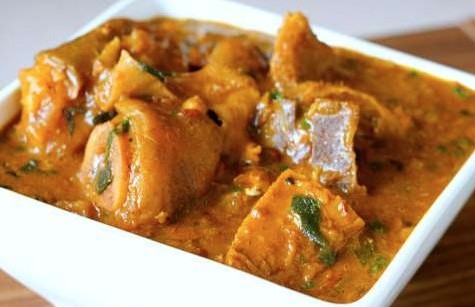Ogbono soup
Unveiling the Richness of Ogbono Soup: A Culinary Delight of West Africa
Introduction: Ogbono soup, also known as draw soup, is a traditional dish deeply rooted in the culinary heritage of West Africa, particularly Nigeria. Renowned for its distinctive flavor, thick consistency, and nutritional value, this soup holds a special place in the hearts and palates of many across the region. In this article, we delve into the origins, ingredients, preparation methods, health benefits, and cultural significance of Ogbono soup, unraveling its allure and inviting you to embark on a flavorful journey through the heart of West African cuisine.
Origins and Cultural Significance: The history of Ogbono soup traces back centuries, reflecting the rich culinary traditions of various ethnic groups in West Africa, including the Yoruba, Igbo, and Hausa. Its name derives from the wild African bush mango seeds, known as “ogbono” or “ogbolo,” which serve as the soup’s primary ingredient. These seeds are ground into a smooth, thickening paste, lending the soup its characteristic texture and nutty flavor.
Beyond its culinary appeal, Ogbono soup holds cultural significance in West African societies, often served during festive occasions, family gatherings, and traditional ceremonies. It symbolizes unity, hospitality, and communal sharing, fostering a sense of belonging and celebration within communities.
Ingredients: The ingredients for Ogbono soup are relatively simple, yet their combination yields a complex and satisfying flavor profile. The key components include:
- Ogbono Seeds: The star ingredient, ground to a fine powder, provides thickness and a nutty taste to the soup.
- Assorted Meats: Beef, chicken, goat meat, or fish are commonly used, adding protein and depth of flavor.
- Palm Oil: Adds richness and enhances the soup’s color, contributing to its vibrant appearance.
- Vegetables: Okra, spinach, or bitter leaf are popular choices, imparting freshness and nutritional value.
- Seasonings: Onions, crayfish, stockfish, and various spices such as chili peppers, garlic, and ginger, elevate the soup’s flavor profile.
Preparation Method: Preparing Ogbono soup is a labor of love, requiring patience, attention to detail, and a mastery of traditional techniques. The following steps outline a basic recipe for this beloved West African dish:
- Heat palm oil in a pot over medium heat, then add chopped onions and sauté until golden brown.
- Incorporate the ground ogbono seeds into the oil, stirring continuously to prevent lumps from forming.
- Add the assorted meats, stockfish, and other desired protein sources to the pot, allowing them to cook until tender.
- Pour in water or broth gradually, adjusting the consistency according to preference.
- Season the soup with crayfish, spices, and salt to taste, allowing the flavors to meld together.
- Finally, add the vegetables, simmering until they are cooked but still vibrant and tender.
Health Benefits: Beyond its delectable taste and cultural significance, Ogbono soup offers a myriad of health benefits, making it a nourishing choice for individuals seeking both flavor and wellness. Some notable advantages include:
- Rich in Protein: The combination of meats and fish provides essential amino acids necessary for muscle repair and overall growth.
- Nutrient-Dense Vegetables: Okra, spinach, and bitter leaf are packed with vitamins, minerals, and antioxidants, promoting immune function and vitality.
- Heart-Healthy Fats: Palm oil contains monounsaturated and polyunsaturated fats, which help lower cholesterol levels and reduce the risk of heart disease.
- Digestive Support: The soluble fiber in ogbono seeds and vegetables aids digestion, regulates bowel movements, and promotes gut health.
- Satiety and Weight Management: The thick consistency of Ogbono soup, coupled with its protein and fiber content, promotes feelings of fullness and helps control appetite, supporting weight management goals.
Conclusion: Ogbono soup stands as a shining example of the culinary diversity and richness of West African cuisine. Its blend of flavors, textures, and aromas captivates the senses while nourishing the body and soul. Whether enjoyed on a cold evening with loved ones or savored during festive celebrations, this traditional dish embodies the essence of communal dining, cultural heritage, and culinary craftsmanship. So, why not embark on a culinary adventure and savor the delights of Ogbono soup for yourself? Your taste buds will thank you, and your journey through West African cuisine will be enriched with every spoonful.



